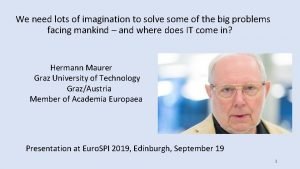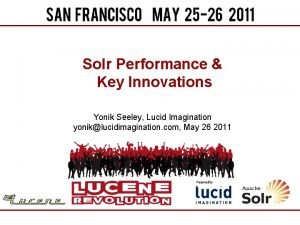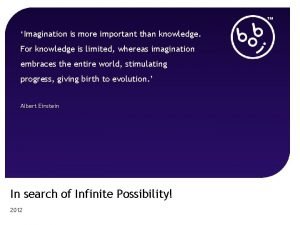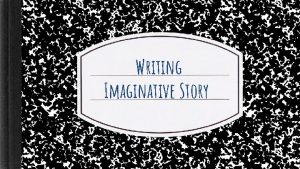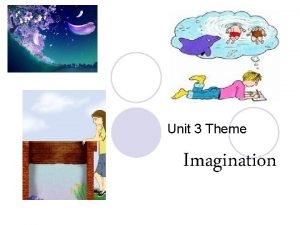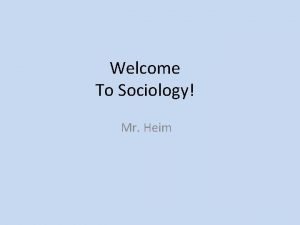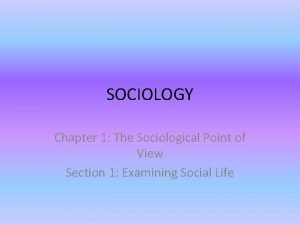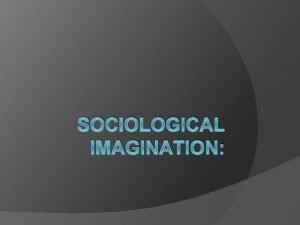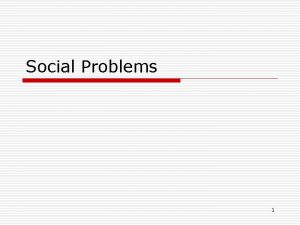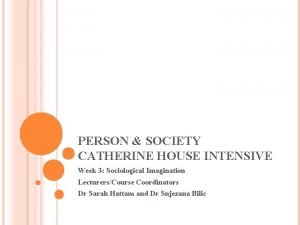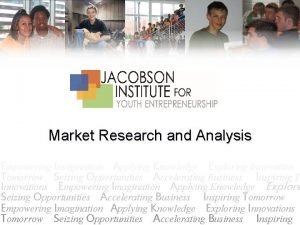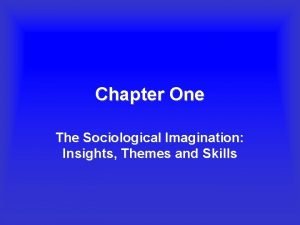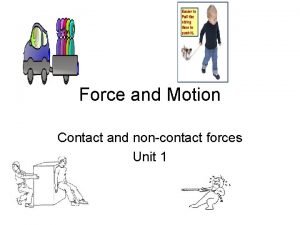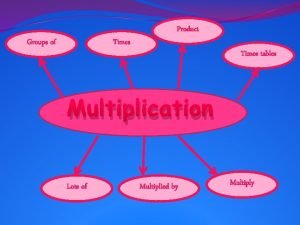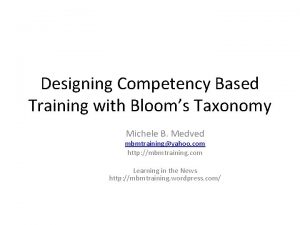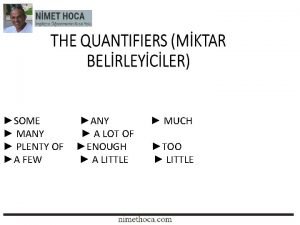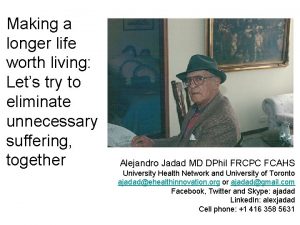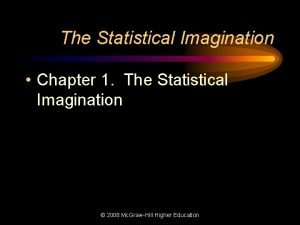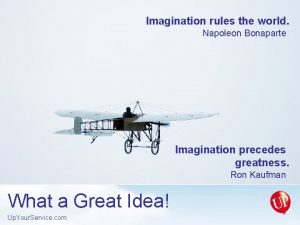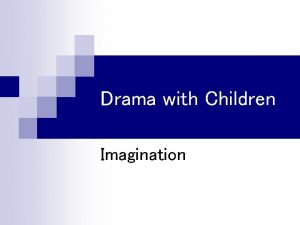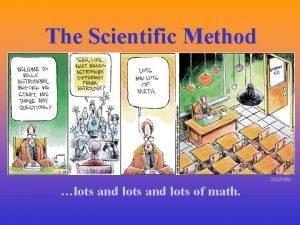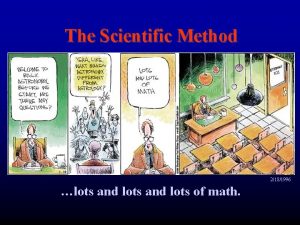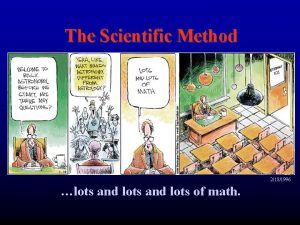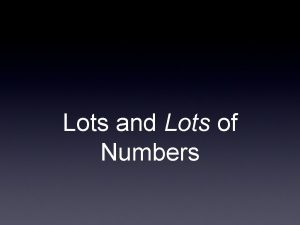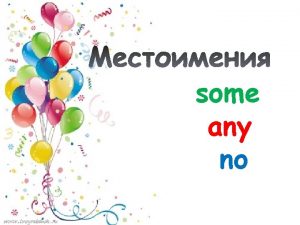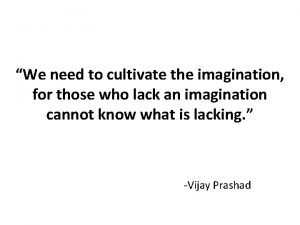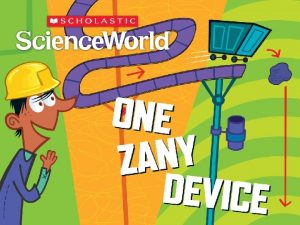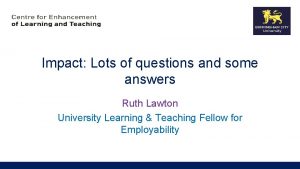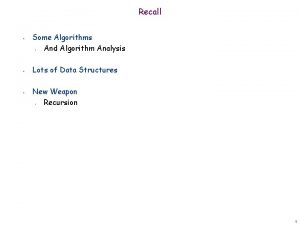We need lots of imagination to solve some

















































- Slides: 49

We need lots of imagination to solve some of the big problems facing mankind – and where does IT come in? Hermann Maurer Graz University of Technology Graz/Austria Member of Academia Europaea Presentation at Euro. SPI 2019, Edinburgh, September 19 1

Main thesis: To solve big problems we need new ideas, lots if imagination: we cannot just treat symptoms, but have to attack the underlying issues. I cannot present solutions to many important problems, but can show that imagination may lead to new approaches. I am a computer scientist. But I start speculations in rather different areas, and will turn to computer related issues later in my talk.

Let me start with an important question: Is CO 2 our enemy as we often hear, or rather our friend? In a way, CO 2 is certainly our best friend: --- Without CO 2: There would be no plants, hence no animals, hence no life --- CO 2 is not poisonous except in very high concentration --- Concentration currently 0, 04 % (400 ppm), rising rapidly from the 300 ppm we had for a long time, but it has also been 20 x higher at other times --- Increases growth-rate of plants Also, CO 2 is valuable raw material as will be explained a bit later.

Problems with CO 2 Main issue in the public mind: As a green house gas it contributes to global warming. (But so do methane, nitrogen oxides, water-vapor and others gasses. ) If we consider CO 2 as enemy, the first question has to be: Where does it come from? First answer is often: Cars --- Transportation related CO 2 emissions are 20% (+/- 6%) of human produced CO 2, less than half by cars (other human activities responsible for rest, e. g. cement production alone for 6%) --- Human related green house gas emission amounts to 40% (+/- 20%) of all emissions Putting this together: Cars are responsible for some 5% of global CO 2 emission per year, i. e. a partial reduction of those 5% does not make a significant difference Note: Figures for CO 2 emissions vary a lot by source. Also, some gasses, although available in larger quantities affect the warming less than others, hence the +/- estimates. The total situation is more complex than can be described here. One example should be enough: The large forest fires in Siberia in 2019 have created enormous amounts of CO 2, yet the re-growth will take care of some of it!

In passing: Without green house phenomenon our planet would not be inhabitable: Average temperature would be – 15 ° C CO 2 is increasing global warming, yet the question remains: Is global warming really bad / dangerous? Are human activities mainly responsible for it? To avoid discussions: Let us assume the answers are „yes“!

Attempts to stop global warming by reducing greenhouse gasses by a change of transport or of food will not be enough. Consider to emphasize CCS (Carbon Capture and Storage) and store CO 2 as gas or solidified, or better still: use it as raw material: --- CO 2 essential for producing carbohydrates, but trees are not best choice! --- With nitrogen, water and bacteria, fermentation can produce protein (hamburgers!) --- Produce CO 2 neutral bio-fuel like ethanol or methanol --- Basis of many pharmaceudical products, all kinds of polymers, and more I. e. don‘t concentrate on reducing emission of CO 2, but rather on filtering and reusing it But: Large amounts of clean energy are necessary for this. Wind, solar, tidal power, waterpower, bio fuels, geothermal energy … may help to bridge a gap. But the real answer is of course:

Nuclear technology Between 2015 and today world-wide the no. of persons killed by car accidents is 4, 000 Between 2015 and today world-wide the no. of persons killed by nuclear accidents is : 0 Currently : (Fission) Uranium reactors; Future: Thorium reactors; Fusion reactors. Is nuclear energy for transport really absurd? Don‘t forget: There is a fleet of nuclear submarines, aircraft carriers and icebreakers. Or how about nuclear batteries. They convert heat generated in the process of natural decay of an element (e. g. Thorium) into electricity. They are small, have no movable parts and generate energy for decades or longer. And have been used in large numbers! (Almost all space probes use them. )

Summary: --- Nuclear energy is important to provide clean energy. --- Countries not using nuclear energy will import energy produced in other countries --- Or import necessary nuclear technology at some stage --- After 2030 Europe is likely to import LFTR (Thorium) reactors from China or India --- Advantage of LFTR: no meltdown possible, radioactive waste is smaller, decays faster Reason why research on LFTR reactors is lagging behind uranium reactors: Military was/is not interested since they are not well suited for nuclear bombs! As is: Probably a mistake to shrug off LFTR as source of clean energy.

However: Fighting climate-change by just condering CO 2, or change of food, or some cultural aspects, is treating symptoms, not the real problem. The real problem is:

Overpopulation and further population growth (1) It is „taboo“ to talk much about the dramatic danger of over-population (2) Yet it will be the cause for dramatic shortages and more pollution (3) It will cause the largest migrations the world has ever seen (4) Let us start to stop or revert population growth and its consequences Some figures: World-population: 1900 --- 1 billion 2050 ---10 billions 1950 --- 2, 5 billions 2100 --- 12 billions TODAY: --- 7, 8 billions

Uganda increased from 5 to 40 million Between 1950 and 2015 Nigeria will have 440 million people (more than all of Europe) by 2050. 200 million or more will want to come to Europe for a better life

Looking at this in another way is even more scary: --- Annual population growth in coming years: >1 % --- Annual standard of living growth in coming years: 3% Consequences: --- The mantra „economy has to grow by 2% or more each year“ has to be given up --- Models for stopping population growth and slowly (over a few centuries) reducing population to acceptable levels ( < 4 billion) and providing decent living conditions for all are needed Do such models exist? Yes, let me show two of many

Proposal 1: Rich countries triple amount of money given to developing countries. HOWEVER: The money does not go to some (corrupt) governments but to an international organisation. Money goes to families with at most 2 children and only for: --- medical treatment --- and a guaranteed pension from age 65 onward The motivation: „many kids“ for support of parents will thus disappear.

Main reason for population growth in e. g. Africa: Very young women have already many babies. To work against this: Develop an injection that sterilizes a young man or woman for (say) 5 years. To make acceptance of injection attractive, receiver gets 2. 000 Euros. Two such injections will mean: a girl can have children after age 25, but not already five as is now the case in some countries. Positive side effect: Young women have time for education! Note: Pharmaceutical companies will fight this approach. Selling one injection ever 5 years is commercially not profitable compared to selling pills throughout.

Proposal 2: With the money from richer countries desalination plants are built where ocean water is not far from a desert. Per head and day 25 l clean water is providable with current techniques at a cost of some € 5. - /day. (Less than the cost for maintenance of people with acceptable living conditions. ) Yet this is enough water for cleaning and cooking. Waste-water used for simple agriculture (vegetables, corn, chicken, goats, …). In shallow bays: Blue algae (cyano bacteria) are grown, consuming much CO 2 and producing valuable raw material.

Algea consume 10 x more CO 2 then ordinary plants, yet provide food, pharmaceudical products, fuel and more.

Idea of Stephen Hawking: More room for mankind by colonising space. Colonising space: A great dream. Yet in our solar system few planets will be seriously colonisable. Mars maybe? Parts of the moon (sub-surface)? There are, however, quite likely a few usable planets within a 20 light-year radius.

Is a distance of light years manageable for humans? The situation is discouraging: --- The fastest speed of a space probe that was ever attained so far was 300. 000 km per HOUR , i. e. 0. 03 % of the speed of light --- The space probe Voyager has been underway for 40 years. It is now at a distance of some 20 light hours. Voyager will reach a different solar system (Sirius) in 160. 000 years --- A space probe that would obtain on its own just 1% of the speed of light would be an incredible sensation (with a futuristic photone-engine and energy generated by a fusion reactor). Note: Ouside support („pushing a probe by a laser“) may allow relativistic speeds for small objects.

Now let me talk on a topic closer to our times: Traffic Discussions often deal with individual traffic versus public traffic and how transport should be powered: combustion engine, e-mobility, hydrogen, …? My conviction: We should not give up the great invention of individual traffic, BUT: --- Current cars are an unacceptable compromise between one-person short-haul transportation, and vehicles carrying a larger group, like a family, to an excursion/ holiday --- Long distance freight must shift to trains

First radical solution: Massive increase of tax on fuel and size of cars, revenues for research and other measures (to be explained in a minute). Advantanges: --- Favours smaller cars with low fuel consumption --- Persons and freight move to trains where possible --- Rental of larger car after train trip or flight possible, yet possession of large car starts to be unattractive

30 min My 30 year old favorite model for a small car is the Mini-Auto (Mauto). The Mauto is built for at most two persons sitting behind each other. Can be coupled with one or more behind, electronically. It travels separated from heavy traffic on „one-way big bicycle trails“. You do not own Mautos: They are ordered by smartphone and come to you autonomously, drop you off where you want. Of course there are problems to solve for autonomous traffic: handling coordination with heavy traffic, ambulances, fire-fighting engines, delivery of large freight, building machinery, etc. Let me state: all is doable, but this is another talk: https: //austria-forum. org/af/Wissenssammlungen/Essays/ Mobility/Skizze_für_neuen_Personenverkehr

Some rebuilding of the road structure will be necessary for Mautos. Yes, but this also applies to autonomous cars: Those will function well only if they move on roads with a tight control of all other traffic. Other ideas for traffic: --- Why do we walk on sidewalks, why don‘t they walk for us (like travellators in airports or escalators in some buildings) --- Why is everything tied so much to the ground? --- Why not more gondolas, drones for delivery, autonomous small freight boats, air ships for point to point transport of large objects? --- Drones will be good for some surprises --- Can Virtual Reality reduce traffic? --- Reduce globalisation, bet more on regionalisation and saisonalisation --- Flying cars?

Flying cars have been around for a long time. Even vertical take-off and landing models like this Moller in which I flew over 10 years ago! www. moller. com

Flying in a Moller with Professor Gio Wiederhold, Stanford. Moller is allowed on roads, but otherwise only in very restricted areas. Problems: What is it, where is it allowed to take off, to land, to fly? Airoplane? Helicopter? Take off where? Landing where? Any route? www. moller. com

Let me now turn to Big Data Analysis. Idea: Analyzing big amounts of data yields interesting results and correlations. Big danger: Correlations can be not causal, but spurious. (Seminal paper by Cris Calude) My favorite fun example: Per head there are more storks in Burgenland (an Austrian province) than anywhere else in Austria. Per head there are more babies in Burgenland than anywhere else in Austria. Thus: Storks are responsible for babies, as all young kids are told in Austria. Unfortunately, there are more subtle cases, where correlations are taken serious.

Statistical significant: --- There areas where the ocean-water is very clean --- Those clean areas are the areas with a significantly higher rate of piracy Thus: Clean ocean-water supports piracy ? ? ? Of course the truth is more complicated: There are fairly remote (and hence clean) areas in the Pacific (like between Samoa and Tokalau). Hence pirates can act there quite undisturbed. Thus the real connection is: Remoteness encourages piracy. That the ocean is fairly clean in those areas is just a by-product of remoteness.

A similar case, but this one very often misinterpreted: --- Car-traffic produces CO 2 --- Global temperature is rising because of more CO 2 Hence: Car-traffic increases CO 2, hence let us restrict car traffic The real reason is much deeper as I have explained: --- More people and a higher standard of living implies more ressources, more cars and production of more waste. Since 1950 and today population has more than trippled (2, 5 - 7, 8 billion) and the number of cars even more… so what can you expect? ? ? Hence: Global warming is not caused by cars, but by the dramatically growing size of population and growing living standards.

Now let me turn to a question I am often asked: Do computers and the internet undermine our cognitive capabilities? I guess we all agree that this is the case to some extent, like: We are not good at arithmetic any more since our smartphone has a calculator Our memory is suffering because we can look up everything on the net or Smartphone Our capacity to write is reduced, since we can copy/paste easily Our spelling gets worse and worse since spell correctors help us anyway Our reading (particularly of complex material) gets worse, because we communicate more and more visually, and Google provides the answers in spoken form Is it still necessary to learn anything, if we can read up all we want to know? Do we still need to learn complex connections when AI is helping us more and more? 28

“The Internet offers incredible amounts of information, pearls and nonsense. Bored users fill their cursors and brains with irrelevant data. They lose the ability to select, to discard, to think and to judge”. (The University of Google, 2007) 29

“How Blogs, Facebook, You. Tube, and other content provided by users in the Web are destroying our economy, our culture and our values” (First edition 2007) 30

“How the digital age is making young Americans stupid and is endangering our future (Or: “Don’t trust anyone under 30”) Communication technology creates a barrier between generations. Young people have only one main aim: to be „in“. by Mark Bauerlein (Erstausgabe 2008) 31

The Net “fragments content and disrupts our concentration”. “. . the way people read and write has already been changed by the Net. It and social media contribute to the ecosystem of interruption technologies” (2010) 32

„We need computers for teaching in schools as much as we need bicycles for teaching how to swim“ Actually, Spitzer is a bit less radical than above quote: To teach early on how to use computers/ the web properly is ok. But an i. Pad for every student? NO! (First edition 2012) 33

Examples are quite scary! One consequence: We must assure that creative thinking and creative person to person communication is not destroyed. However: We also must accept that many cognitive facilities mentioned will be reduced by computers, smartphones, the web. But this is not quite as bad as it sounds! 34

We need a new interpretation of what a human being is: It should not be viewed as something purely biological but as symbiosis of biology and technology. Humans must be seen together with all tools they are using, external or internal. Example: Hermann Maurer. He is deaf, needs glasses to see things in focus, has a pacemaker, and an artificial hip, and will soon need new knees. Without those tools: He will be crippled or dead. As is, he still feels quite alive. 35

This is not a new phenomenon. My grandfather was able to run with a heavy load faster and further than I ever could. Yet I beat him: I put more stuff than he could ever carry into my car and transport it further and faster than he would ever have been able to do! We must accept: Technology has always led to the reduction of some of our capabilties. And this is quite OK if: (a) Our loss is overcompensated by technology (b) Our creativity, our feelings, our humanity remains, and (c) A complete breakdown of technology cannot lead to a global catastrophy. 36

I have written some 50 Science Fiction Books over the years. One („The Paranet“) is on such complete electronic breakdown. The first 7 chapters are realistic. Forget the remaining 5 chapters: I save mankind when in reality there would be no way to save it. The book is sold out, but if you are interested: Note or I send the URL https: //austria-forum. org/web-books/xperten 09 en 2004 iicm where you can download the PDF Just write to me : hmaurer@iicm. edu 37

Let us now turn to another aspect: Automation It is clear that it will continue. There is always the discussion whether it will destroy jobs. Most argue that it will create sufficiently many new ones. This is just a lie! My grandfather worked about 3. 200 h / year. Today the typical Austrian fully employed person works 1. 600 h/ year. And this will further decrease. (In 50 years: 9 weeks holiday per year, 24 hours work per week. ) Discussions often involve AI and complex tasks, but of course the majority of jobs in banking, in administration, in public transport, …. etc. will disappear. We better start to believe that AI gadgets will replace humans more and more. What should we do when jobs will disappear on a very large scale?

One thing governments have been doing to retain a large number of job is to create „pseudo-work“ Examples: --- Collecting money from cars in many ways (when you buy it, when you buy fuel, special insurance, sticker to drive on autobahns, special fees for going through tunnels, fees for parking, …. ) --- Administration for hundreds of unnecessary tasks (filling out questionaires, EU data protection laws, . . . ) … Typical example: Austria had 60 million people till 1918, administered by people in Vienna. Austria shrunk to 6 Million in 1918. The number of government employees did not change: They were very clever in creating unnecessary work for each other… Stop unnecessary work. Let us be happy if there is less work to do. But distribute remaining work and related income in a just way.

Don‘t be afraid of not enough work. Working for money does not make happy. Working towards a positive goal does! We have to recognize talents of children als soon as possible to educate them the right way. --- For the communicative types who care for others make sure they are led to jobs dealing with people: Teachers in schools and kindergarten, medical helpers, helping handicapped persons, looking after sick or lonesome or elderly people, …. --- For those with manual talents: Let us revive handicrafting, repairshops, repair rather than displace prodcuts, small scale gardening, create art, regionalize rather than globalize --- For intellectually talented: Academic career as doctor, as engineer, as researcher, as inventor, …. My conviction: Computers will lead to a wave of unemployment unless we define a number of alternative types of work as indicated. Otherwise, we are going to produce a wave of unemployable academically trained persons.

Summarizing: Automation will change our economy dramatically This will require a re-distribution of wealth and of work, or we will be confronted with serious justified social unrest. Let me now briefly mention the problem of instability of digital information, due not to failures, but simply changes of formats, HW and SW. I experienced this because some 40 years ago I was involved in „Interactive Videotex“ (Bildschirmtext or BTX in Austria and Germany), a kind of pre-cursor of the Web, now long defunct and forgotten.

B. T. W, unfortunately, some important features of BTX were not incorporated into the Web. In BTX: --- Anonymous offers were impossible. All information came from registered organisations or users, with known persons one could contact --- Anonymous mails were impossible (no SPAM, no problems with malware, …) --- Pages could have minimal fees

Graphic images were possible in BTX. A young artist (Daniel Rozenberg) created cartoons for BTX in 1982. He is by now the famous Dutch cartoonist „Dardara“. For his biography he asked in 2017 if he could get some of his early work for the introduction. But BTX had closed down some 20 years ago! The attempt to reconstruct some of his cartoons worked by chance, but was a tremendous effort.



Data mining Information leak Machine Learning In this case it was possible to restore information. However, developments in HW, SW, formats, interfaces etc. will assure that much of the information we have today will be lost before long. This is even true of PDF. It is an unsolvable problem (? ) right now for 3 D or interactive information. Drowning in the sea of information

To combat fake news or slanted news we need trustworthy portalservers in all countries: A recent recommenation in a report on those issues to the EU parliament states: „We are in the danger to move from a fact oriented society to an emotion oriented society…the only way to combat this is by having portals with truly trustworthy information. “

This is the kind of research I am involved in: Building a new kind of portal server, by now with over 1, 1 million media-objects with properties such as: --- contributions have authors with CVs accessible, authors can be contacted anonymously, but even so they can answer (!) --- users can comment identified or anonymously --- thousands of digital books are incorporated, a link from a contribution to a chapter in an authoritative book can confirm its quality --- book-pages and web-pages can be mutually linked to strengthen reliability of information --- searching by topic leads to snippets of relevant information from many sources (AI!) --- answers are provided with the definitions they are based on I believe we will have a SW for a truly intelligent portal server/ digital library available by this year‘s end

If you are interested in the system, contact me at hmaurer@iicm. edu or have a look at a prototype at http: //austria-forum. org Thanks for your attention and giving me the chance to re-visit beautiful Scotland Hermann Maurer
 With lots of imagination and new ideas
With lots of imagination and new ideas Fill in the gaps with some or any
Fill in the gaps with some or any I need some fire
I need some fire Lucid imagination
Lucid imagination Gination knowledge
Gination knowledge Imaginative narrative
Imaginative narrative Through grandpa's eyes questions and answers
Through grandpa's eyes questions and answers General electric imagination at work
General electric imagination at work Lucid imagination
Lucid imagination Debts or money owed
Debts or money owed Sociological imagination examples race
Sociological imagination examples race Destination imagination 2001
Destination imagination 2001 Imagination farms
Imagination farms Maxine greene releasing the imagination
Maxine greene releasing the imagination Immersion interaction imagination
Immersion interaction imagination Betty bought butter
Betty bought butter By adopting a sociological imagination
By adopting a sociological imagination Destination imagination 2001
Destination imagination 2001 Youtube sociological imagination
Youtube sociological imagination Empowering imagination
Empowering imagination Problems with conflict theory
Problems with conflict theory Exercise your imagination
Exercise your imagination How sociologists view social problems: the abortion dilemma
How sociologists view social problems: the abortion dilemma Individual agency
Individual agency Psychodynamische imaginative traumatherapie
Psychodynamische imaginative traumatherapie Sociological imagination vs sociological perspective
Sociological imagination vs sociological perspective Empowering imagination
Empowering imagination The sociological imagination chapter 1 summary
The sociological imagination chapter 1 summary The man with no imagination has no wings
The man with no imagination has no wings Some say the world will end in fire some say in ice
Some say the world will end in fire some say in ice Ice countable or uncountable
Ice countable or uncountable Some may trust in horses
Some may trust in horses Sometimes you win some
Sometimes you win some What are some contact forces and some noncontact forces
What are some contact forces and some noncontact forces Some say the world will end in fire some say in ice
Some say the world will end in fire some say in ice God when you choose to leave mountains unmovable
God when you choose to leave mountains unmovable 463x5
463x5 Regrettably these days lots of people don't have jobs
Regrettably these days lots of people don't have jobs Remember lots wife
Remember lots wife If you had lots of money what ____
If you had lots of money what ____ Hots and lots
Hots and lots Jeffrey holland lot's wife
Jeffrey holland lot's wife Different kinds of sport
Different kinds of sport Much vs many
Much vs many A lot of / lots of
A lot of / lots of Concession system of southern ontario
Concession system of southern ontario Picture with lots of things happening
Picture with lots of things happening Biog lots
Biog lots Much many farkı
Much many farkı E lots
E lots
